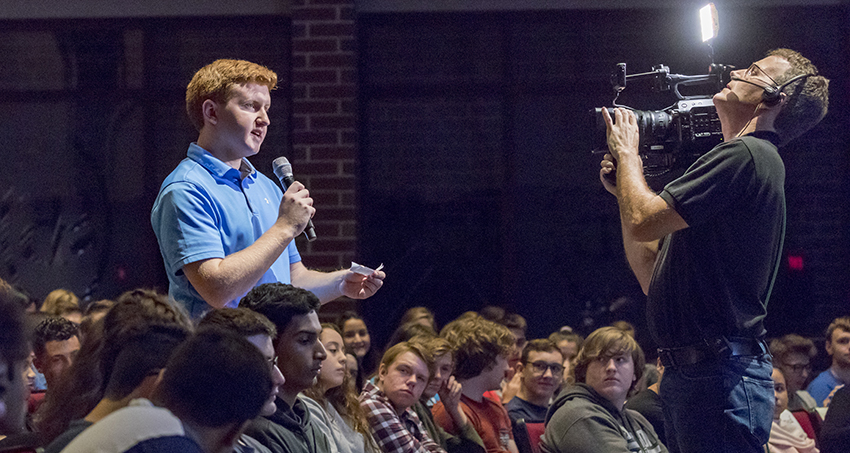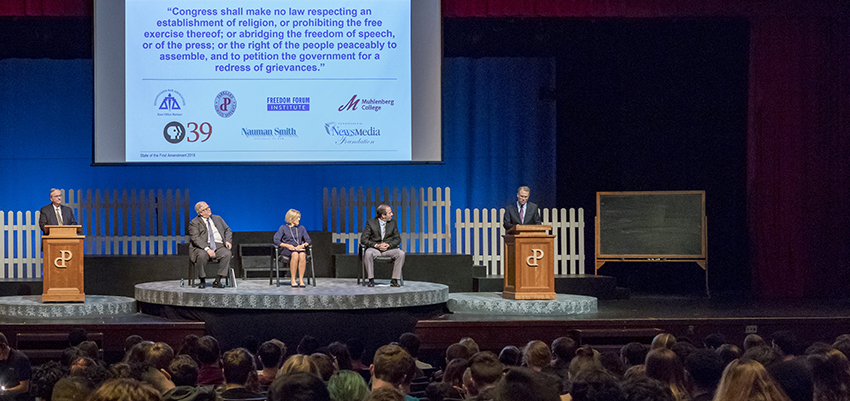First Amendment Forum Explores Constitutional Freedoms
Muhlenberg College Institute of Public Opinion surveys 800 Parkland High School students to compare their knowledge and beliefs to national results.By: Bill Keller Thursday, October 11, 2018 03:04 PM

For Parkland High School’s seniors, conversations around the First Amendment—and associated topics of fake news, the role of the press and the impacts of social media—hold particular significance, with many of the students eligible to vote for the first time in November’s midterm election. Those students recently had an opportunity to compare their thoughts on important topics to the thoughts of the nation as a whole through a first-of-its-kind interactive forum held in their Allentown, Pennsylvania, high school auditorium.
Each year, the Freedom Forum Institute surveys the public concerning their knowledge of and feelings towards the First Amendment of the U.S. Constitution. Many of the respondents (about 40 percent on average) have trouble naming even one of the five freedoms of the First Amendment—the right to petition the government for a redress of grievances, the right to peaceably assemble and the freedoms of religion, speech and the press. And yet 23 percent of this year’s national respondents thought the First Amendment provided too many freedoms to citizens.
This year, for the first time, Freedom Forum Institute’s national poll was adapted for high-school use by Muhlenberg’s Institute of Public Opinion, a nationally acclaimed, student-run polling center that achieves consistently accurate results.
"Citizens in other countries are fighting even with their lives to gain freedoms that Americans, according to the national survey, are apparently ready to give up," said David Erdman, forum coordinator and Muhlenberg College lecturer in media & communication. "This, coupled with the political environment where many consider media an 'enemy of the people' rather than the cornerstone of democracy it is and why so many people rabidly want the government to restrict the press, is why we considered it an important time to offer this forum to reach high school students and others."
When measured against the national survey results, Parkland High School students scored much better: Only two percent of the high-school seniors were unable to name any of the freedoms. Just 10 percent felt that the First Amendment went too far in providing liberties to Americans.
And while some similarities existed—both the national and the Parkland surveys indicated a strong belief that the media should act as a government watchdog and a disbelief that the President of the United States should be permitted to deny press credentials—Parkland students varied from the national norm in more than their knowledge of the rights. For example, a majority of students believed that colleges should be more empowered to restrict speakers on campus if there’s a risk of inciting violence, offending individuals or provoking large-scale protest.

In addition to debuting and assessing the Parkland High School poll, the event featured questions from students engaged in the school’s political science club, with queries ranging from the application of the First Amendment to private enterprises like the NFL to the reasons why hate speech, while antithetical to many communities’ values, can be considered a protected right.
Those questions were answered by a panel of experts with diverse perspectives—Christopher Borick, Muhlenberg College professor of political science and director of the Institute of Public Opinion; Alice Stinebaugh, a teacher at Parkland High School; and Gene Policinski, president and chief operating officer of the Freedom Forum Institute. Their constituencies at the national and educational levels shaped their thoughts, but each expressed admiration for the students’ knowledge and engagement.
For the Parkland students, the timing of these questions comes at a critical juncture where they are preparing to complete high school and enter the workforce or proceed to higher education. Knowledge and awareness of constitutional freedoms tend to drop off when not reaffirmed in academic settings, as Borick noted is even the case at some colleges, where the topics may only be covered in political science or history courses.
And, according to the panelists, the freedoms of the First Amendment that encourage and enable individuals to challenge beliefs and perspectives is something that will prove useful in the years after high school.
"As a professor, I know that being uncomfortable is often part of the learning experience," Borick said at the event. "I tell my students 'I hope you challenge each other all the time—I hope that you push each other to come up.' When you are given a good argument, sometimes you change your mind, and you're only given that in a situation that's a little uncomfortable."
The October 10 First Amendment Forum was coordinated by David Erdman, lecturer of media & communication, and sponsored by Muhlenberg College, Parkland School District, the Freedom Forum Institute, the Pennsylvania Bar Association, Nauman Smith law firm and the Pennsylvania News Media Association. PBS39 filmed and co-sponsored the event, and will air the telecast on October 24.
About Muhlenberg College
Founded in 1848, Muhlenberg is a highly selective, private liberal arts college offering baccalaureate and graduate programs. With an enrollment of nearly 2,000 students, Muhlenberg College is dedicated to shaping creative, compassionate, collaborative leaders through rigorous academic programs in the arts, humanities, natural sciences and social sciences; selected preprofessional programs, including accounting, business, education and public health; and progressive workforce-focused post-baccalaureate certificates and master’s degrees. Located in Allentown, Pennsylvania, approximately 90 miles west of New York City, Muhlenberg is a member of the Centennial Conference, competing in 23 varsity sports. Muhlenberg is affiliated with the Evangelical Lutheran Church in America.
